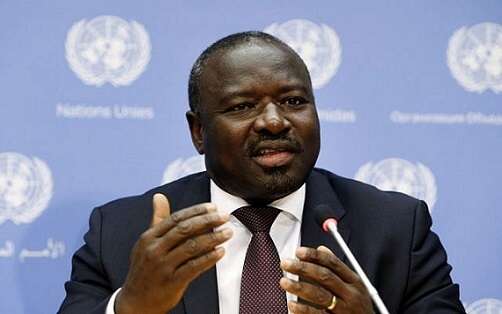Iran may be interested in joining a key nuclear treaty if the United States rescinds its threat to withdraw an existing deal addressing Tehran's nuclear ambitions, the head of a prominent nuclear watchdog organization said on Monday.
Lassina Zerbo, executive secretary of the Comprehensive Nuclear Test Ban Treaty Organization, was speaking on the sidelines of a nuclear nonproliferation conference in Geneva, where many diplomats were concerned about U.S. President Donald Trump's threat to quit the Iran nuclear deal known as the JCPOA.
The deal, reached between Iran and six world powers in 2015 in an effort to curb Iran's nuclear efforts in exchange for lifting crippling international sanctions, would be effectively revoked if the U.S. pulls its participation.
Washington distrusts Iran and argues the agreement is too weak, but Zerbo said that if Iran was trusted, he was hopeful it might ratify a total ban on nuclear explosions as a signatory of the Comprehensive Nuclear Test Ban Treaty, known as the CTBT.
"I think any support of the JCPOA would get Iran to consider the CTBT," he said. "The only way to leverage [the situation] is to see trust and confidence in Iran that will push them into considering the comprehensive test ban treaty, and this is my hope and this is what I'm working for."
Zerbo told a meeting of diplomats that he had met Ali Larijani, the speaker of Iran's parliament, in St. Petersburg in October 2017 and asked him why Iran was not considering ratification of the CTBT.
"He said they have nothing against the CTBT but they are looking at the JCPOA and his point was, 'How do we come to the CTBT when there is doubt on the JCPOA?' That was his answer to me," Zerbo said.
"Let's see what the JCPOA brings, and that could open up opportunity to consider the CTBT by the Iran parliament, by the Iran authorities, and then to gather more consensus in civil society," he added.
Asked how seriously he took Larijani's comments, Zerbo said he regarded Larijani as a sincere and honest person who had not been under any obligation to hold such a discussion.
"We spent nearly 40 minutes discussing views, which I would say is unprecedented because we never had this kind of high level discussion from the CTBT perspective with high-level officials," he said. "This was a deep discussion between my team and speaker of the parliament Larijani's team in St. Petersburg."
Larijani had discussed the work done to get the JCPOA accepted in Iran, and Iran wanted to see the benefit of that before considering any other treaty, Zerbo said.
An Iranian delegate at the meeting, Tehran's former ambassador in Vienna, declined to comment.
U.S. Assistant Secretary Christopher Ford, Washington's nuclear nonproliferation envoy, was skeptical about Zerbo's hopes and the prospects for Iran's ratification.
"I remain to be convinced," Ford said.
Iran and the U.S. have signed but not ratified the CTBT. They are among eight nuclear technology states whose ratification is needed for it to come into force.




